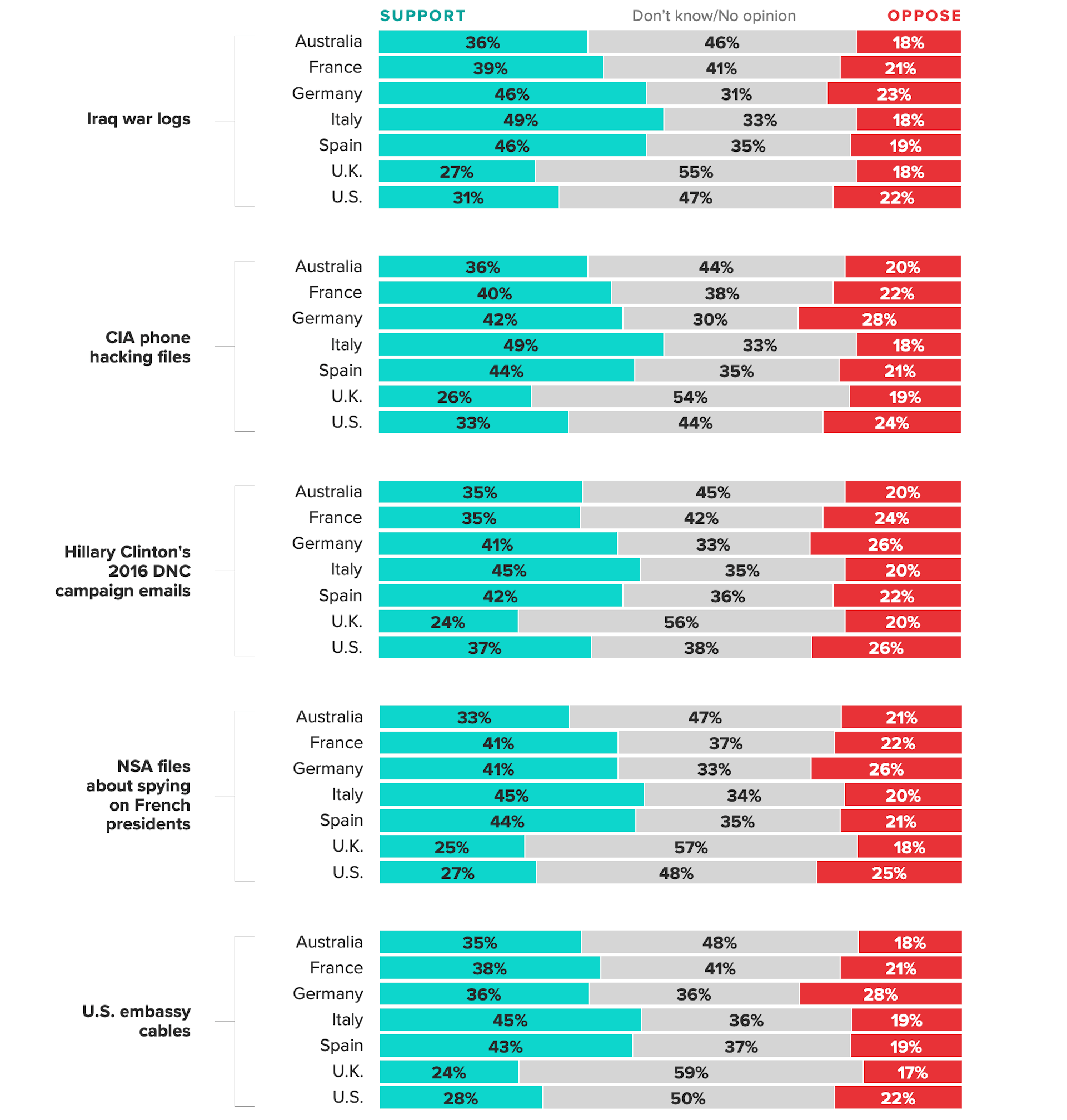Many in the West Support Assange’s Leaks, and Few Want Him Extradited to U.S.
As WikiLeaks founder Julian Assange remains in extradition limbo, a new Morning Consult survey shows Americans, Europeans and Australians are far more likely to say the Australian national was “right” than “wrong” to shed light on U.S. government policies such as the secret surveillance of American citizens, and few want to see him extradited to face espionage charges in the United States.
Few Americans, Europeans and Australians Say Assange Was Wrong to Publish Sensitive U.S. Information
- Adults in Australia, France, Germany, Italy, Spain and the United Kingdom are at least twice as likely to say Assange was “right” than “wrong” to release secret U.S. government documents, according to surveys in August and September, with Germans (60%) and Australians (52%) expressing the strongest backing for the leaks.
- Only in the United States is support (42%) for the 51-year-old’s publications less than twice the opposition (24%). Republicans are far more likely to support Assange’s actions (50%) than oppose them (19%), but Democrats are close to being split: 36% support and 32% oppose the leaks.
- The backing for the publication of secret documents doesn’t translate into popularity for Assange. At 35%, his favorability rating is highest in Germany and Italy, followed by Australia (33%), Spain (28%) and France (21%). Australians are more likely to say they have no opinion (30%) of their compatriot than they are to have an unfavorable view (21%) of him.
- Only in the United Kingdom and United States is Assange truly unpopular: 17% of Americans and 14% of U.K. residents hold favorable views, compared with 22% and 23% with unfavorable views, respectively. But 45% of Americans said they’ve never even heard of him, which is second only to the 48% of French adults who said the same.
Few Westerners support Assange’s extradition
Assange, who founded WikiLeaks in 2006, is appealing a June 17 decision by the U.K. government to extradite him to the United States to face trial on espionage charges for publishing U.S. government documents, which could lead to a 175-year prison sentence.
The U.S. government has accused Assange of a number of crimes, including conspiring with former Army analyst Chelsea Manning to crack Defense Department passwords to obtain and release classified military reports about the wars in Afghanistan and Iraq. But Assange’s legal team says he only ever operated as a journalist in receiving and publishing leaked documents from sources, and that he will not face a fair trial if he is sent to the United States.
On the question of extraditing Assange, there is a lack of support across Europe’s five largest economies and Australia. Only 21% in Australia back extradition, compared with 46% who oppose it, but it’s Germans who are most against the idea: Just 18% want to see Assange’s extradition go ahead, compared with 52% who said it should not. Opposition outweighs support by 12 percentage points in France, 13 points in Spain and 27 points in Italy.
Only Americans are far more likely to back extradition than not: Support is at 40%, almost double the 21% of adults who are opposed. In the United Kingdom, support for extradition also outweighs opposition, but the gap is much narrower: 30% of U.K. adults support Assange’s extradition, compared with 26% who oppose it. But many in both countries said they have no opinion: 39% in the United States and 44% in the United Kingdom.
In fact, across each country surveyed, sizable portions said they have little knowledge or no opinion about Assange’s activities. That’s especially true when it comes to particular leaks.
WikiLeaks Releases Are More Likely to Be Supported Than Opposed, but Many People Are Unsure

Many Westerners don’t have an opinion about specific WikiLeaks releases
- Although adults across Europe, Australia and the United States are more likely to say they support than oppose each individual WikiLeaks release of classified U.S. material, such support is, in almost all cases, dwarfed by the share who said they have no opinion.
- The lack of any opinion is most apparent in the United Kingdom: Majorities of U.K. adults said they haven’t heard about the release of the Iraq war logs, CIA phone hacking files, former presidential candidate Hillary Clinton’s 2016 campaign emails, files concerning spying on French presidents or the millions of U.S. embassy cables from 1973 to 2010.
- In France, the 41% who support the release of files that showed the United States spied on French presidents Jacques Chirac, Nicolas Sarkozy and Francois Hollande from 2006 to 2012 is trailed closely by the 37% who have no opinion about it.
Surveys conducted Aug. 5-6, 2022, in the United Kingdom, Sept. 7-9, 2022, in the United States and Aug. 16-17, 2022, in Australia, France, Germany, Italy and Spain, among representative samples of at least 1,000 adults in each country, with unweighted margins of error of up to plus or minus 3 percentage points.
Alex Willemyns previously worked at Morning Consult as an editor for coverage of geopolitics and foreign affairs.